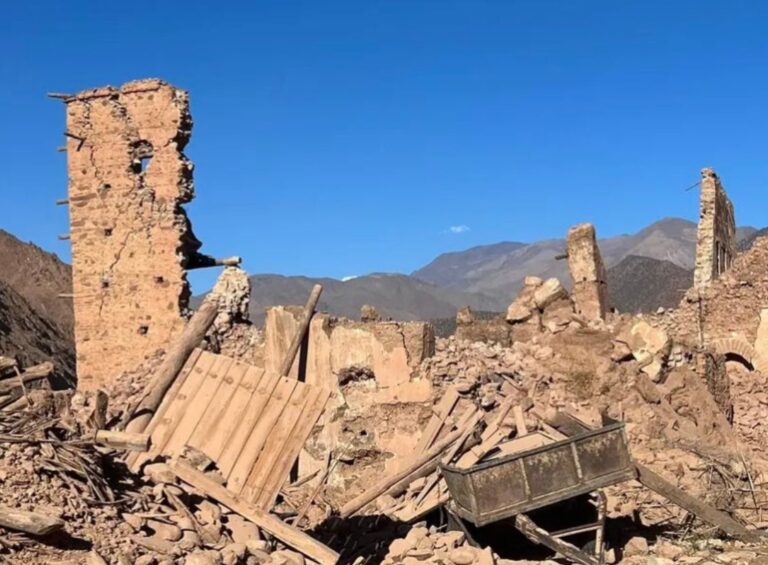Fourth consecutive night on the streets for earthquake victims in Morocco, as soldiers and international humanitarian teams with trucks and helicopters begin pouring into the remote mountain villages most devastated.
The disaster has killed at least 2,497 people – a number set to rise. The injured are at least 2,420. The United Nations estimated that 300,000 people were affected by Friday night’s 6.8 magnitude earthquake.
Most of the deaths, 1,351, occurred in the Al Haouz district in the High Atlas Mountains, the ministry said. Flags were lowered across Morocco after King Mohammed VI ordered three days of national mourning starting Sunday.
Table of Contents
Another aftershock yesterday
NGOs are also present in the region, assessing the needs, other than shelter, food and water, of the people left behind in villages like Tikht. According to the U.S. Geological Survey, those areas were shaken again yesterday by a magnitude 3.9 aftershock. It was not immediately clear whether it caused more damage or casualties.
People are digging, relentlessly and even with their bare hands in the race against time to still find life under the piles of rubble. Especially in those rural and remote areas, the epicenter of the quake, that still remain isolated, with relief efforts struggling to reach villages. The winding connection between Marrakech and the Atlas Mountains remains disrupted.
As the dead begin to be buried throughout the affected areas, reports are also coming in of foreigners killed (four French). In Morocco, a Muslim country, cremation is not allowed. And generally believers in the Islamic religion are buried within 24 hours of death or at least as soon as possible.
Rabat accepts aid from only 4 countries
While King Mohammed VI has asked authorities and citizens to pray in all mosques in the Kingdom, controversy mounts over aid.
Morocco has reportedly accepted relief teams from only four countries. Namely, Spain, the United Kingdom, the United Arab Emirates and Qatar – and all the other people who are helping are volunteers.
The denunciation also comes from the president of the French NGO Secouristes sans Frontières, Arnaud Fraisse. “Normally we would have taken a plane taking off from Orly one minute after the earthquake. Unfortunately, we still don’t have the agreement of the Moroccan government.”
From many countries, however, the solidarity race has begun. Algeria has proposed an urgent plan to provide aid, should Rabat wish to accept it given its difficult relations with its neighbors. The EU is providing initial funding of 1 million euros “to support the relief efforts put in place by humanitarian partners in the country.”
The European Commission specifies that Morocco “has not applied for assistance at this time.” Italy said it was ready to send aid and medical teams. As have France, Turkey and the United States.
Why Morocco refuses help from other countries
The government justified the decision by explaining that “the lack of coordination could be counterproductive.” But “does not rule out authorizing other aid if it proves necessary.”
Authorizations for aid, however, are not entirely random. Thus suggesting that strategies for diplomatic or geopolitical purposes are behind the government’s choices. All the countries that currently received a “yes” to the disbursement of aid are all those countries that are siding with Morocco in the dispute over the status of Western Sahara.
A multi-party disputed territory on the border with Morocco, clashes and skirmishes in the disputed territories between Rabat and self-proclaimed independent communities have been reignited between 2020 and 2021. In 2020, President Donald Trump recognized Rabat’s sovereignty over the region in exchange for normalization of relations between Morocco and Israel.
And the reasons for the “no” votes for aid delivery are perhaps even more obvious. The Wagner Group and aid to coup-makers in Mali and Niger keep Russia out. Qatargate and human rights issues prevent the authorization of aid from EU countries. And Turkey is rejected for Edogan’s diplomatic policies targeting North Africa.
The “no” vote to France weighs more than others
But the “no” to Macron affects more than the others. Morocco has not accepted its former colonizer’s aid proposal. And this has increased tensions between the two, which are nothing new. Paris-Rabat relations have been frosty for a few years.
The reason is the Pegasus scandal. That is an investigation alleging that Moroccan King Mohammed VI had tapped Macron’s phone conversations through an Israeli company.
On top of this are the controversies between France and Morocco over non-compliance with agreements on the repatriation of illegal migrants, again differences over the Western Sahara dispute, and the Elysee’s rapprochement with Algeria.
French Foreign Minister Catherine Colonna in an interview with BfmTv denied any tension between France and Morocco.
The minister cooled the tensions. Thus denying the existence of a “querelle” between the two governments and called for “respect” for the decisions of Morocco, which is “a sovereign country” that has decided to “prioritize the arrival of aid, turning to the available countries on a case-by-case basis and not receiving aid that would not correspond to its needs.”
Read also: Will BRICS emerging countries wage (economic) war on the West?












